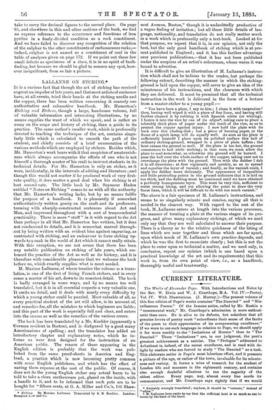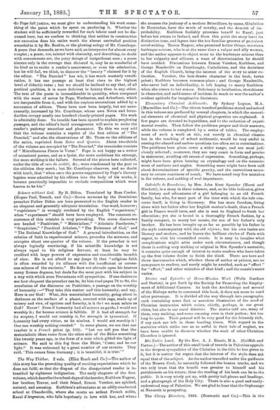CURRENT LITERATURE.
The Works of Alexander Pope. With Introductions and Notes by the Rev. W. Elwin and W. J. Courtbope, M.A. Vol. IV.—Poetry, Vol. IV. With Illustrations. (J. Murray.)—The present volume of this fine edition of Pope's works contains" The Dunciad " and "Mis- cellaneous Poems." Of the famous satire, called by Mr. Ruskin a "monumental work," Mr. Cotuthope's admiration is more enthusi- astic than ours. He is alive to its defects, but considers that all genuine lovers of poetry must "subordinate their sense of the faults of the poem to their appreciation of its overpowering excellence." If we were to use such language in relation to Pope, we should apply it far more readily to the " Imitations of Horace " than to " The Dunciad." These "Imitations " are, in our judgment, the poet's greatest achievement as a satirist. The "Prologue" addressed to Arbuthnot is, indeed, of the rarest excellence, and is read with de- light by readers who are forced to study " The Danciad " as a task. This elaborate satire is Pope's most laborious effort, and it presents a picture of the age, or rather of the town, invaluable for its minute- ness and variety. It forms. a 'mine of research for the student of London life and manners in the eighteenth century, and contains also enough doubtful allusions to tax the sagacity of the ablest editor. Every page, nay, almost every line needs its commentator, and Mr. Courthope says rightly that if we would • Probably wrongly translated ; anyhow, it should be " corners," instead of t Lallanne here omits to say that the sufficient heat is as mach as can be
borne by the back of the hand.
do Pope full justice, we must give to understanding his work some- thing of the pains which he spent on producing it. Whether the student will be sufficiently rewarded for such labour need not be dis- cussed here, but we confess to thinking that neither in construction oor execution does his satire merit the almost unrivalled position awarded to it by Mr. Ruskin, or the glowing eulogy of Mr. Courthope. A poem that demands, as we have said, an interpreter for almost every couplet ; a poem, too, tainted with obscenity, and describing, no doubt with consummate art, the petty doings of insignificant men ; a poem sincere only in the revenge that dictated it, may be so wonderful of its kind as to excite a reader's amazement, or even his admiration, but he will fail, we think, to discover the " beauty " claimed for it by the editor. "The Dunciad" has wit, it has much masterly versifi- cation, it has one passage at least that rises to the highest level of didactic verse ; but we should be inclined to say that, of all poetical qualities, it is more deficient in beauty than in any other. The text of the poem is inconsiderable in quantity, when compared with the mass of notes by Pope, Warburton, and Arbuthnot, which are inseparable from it, and with the copious annotations added by a succession of editors. These have now been largely, but not unne- cessarily, increased by Mr. Courthope, whose own Notes and Intro- duction occupy nearly one hundred closely-printed pages. His work is admirably done. No trouble has been spared to explain perplexing passages, and the editor's lucid arrangement will serve to make the reader's pathway smoother and pleasanter. To this we may add that the volume contains a reprint of the first edition of "The Dunciad," and also the observations of Mr.. Thom on the editions of the satire, reprinted from Notes and Queries. About two-thirds of the volume are occupied by "The Dunciad," the remainder consists of " Miscellaneous Pieces in Verse." Pope is not happy as a writer of occasional poems, and as a lyrist, the more ambitious his attempt, the more striking is the failure. Several of the pieces here collected, under the title of vers de societe, &c., were condemned by the poet to the oblivion they merit ; but Mr. Courthope observes, and no doubt with truth, that " when once the poems suppressed by Pope's literary legatee were admitted by his editors into the body of his works, it became practically impossible to exclude compositions which were tnown to be his."



































 Previous page
Previous page